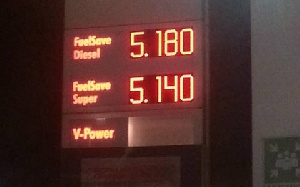 The government is watching uncontrollably with dread as fuel prices continue to inch upward
The government is watching uncontrollably with dread as fuel prices continue to inch upward
Grumbles about the price of petrol might seem marginal to people who ride on donkeys to work, but of course, society has evolved, and so has transport technology.
Invariably, we all feel the pinch. Many Ghanaians are switching off air conditioners in their cars and cutting down on weekend trips in a bid to save money, as petrol prices across the country hover around GH¢ 5.12 per liter; an unusually high level in a spate of 3 months. Can this growth trend be reversed?
Government has come under immense pressure by citizen vigilantes and social groups to intervene and ‘arrest” fuel prices. Is this a fiscal strategy that can be explored? In other words, is this plausible?
The government is watching uncontrollably with dread as fuel prices continue to inch upward. Consumers, on the other hand, are worried as this affects their livelihoods – directly and indirectly. Hard-pressed commercial drivers and business groups are complaining bitterly. The average worker is exceptionally worried; on average 82% of workers’ incomes are spent on fuel, based on data I collected and analysed.
The Petrol Journey
The 2009 global financial crisis really affected global fuel prices. Economies around the world sputtered to a grinding halt, and demand for oil dropped. Oil prices dropped from historic highs of $144.29 in July 2008, to $33.87 in December 2018. The world’s traditional ‘swing crude oil producer’ – OPEC, cut production to about a third to shore up prices and bring back parity. In the aftermath of the global recession, petrol prices in Ghana hit a record low of $ 0.81 or GH¢ 1.4.
When global prices ‘improved’, petrol prices also climbed steadily to an all-time high of $ 1.1 or GH¢ 2.2. Prices continued to hover around GH¢ 2.2 – GH¢ 3.5 two years later until prices plummeted again in 2015. Global prices fell yet again, because producers around the world refused to tame production after tepid demand growth began to emerge. As 2014 was driven by weaker-than-expected demand, the crash in crude was largely caused by oversupply.
Since 2014, WTI Crude Oil Prices has worked through a downward descent from $103.1 to 29.6 in 2016 and then a steady climb to $68.86 as at September 17, 2018. A hypothetical assumption based on the trend analysis would reveal that, the rate of increase in further rise of global prices would significantly affect the price of fuel at the pumps. For example, if global prices return to the $100 mark in the near future, Ghanaians could be paying well over GH¢ 6.8. This of course is alarming.
Ghana Today
In my estimate, on average, Ghanaians who drive use up to 82% of their income on fuel and 43% for public transport commuters. To compare, South Africans spend an average of 24% of their monthly earnings on fuel whereas Gabon, a country with a population of 2 million, has its citizens spending 22% of their monthly earnings on fuel.
The data analysis utilized macroeconomic data such as Gross National Income (GNI) per capita, i.e. the dollar value of a country’s final income in a year, divided by its population and current fuel prices. The GNI per capita value reflects the average income of a country’s citizens.
Ghana Petrol Prices (USD/Liter): 2010-2018
Source: Trading Economics & National Petroleum Authority
A real reason to panic?
Do oil prices influence economic growth in Ghana? Different research outcomes have been inconclusive on this subject but it appears that there is a significant relationship between fuel prices and economic growth especially for net importers of oil such as Ghana.
A common anecdote well known in Russia is that, the only commodity the Russian government dares to regulate or influence is the vodka, else, the citizenry take to the streets. In Ghana, fuel price is the main concern for everyone, as transportation costs affects everyone.
USD to GHS Exchange Rate: 2009 – 2018
Source: XE Currency Data
Consequences & Potential Remedy
The idea to streamline petrol prices and remove subsidies, according to policy makers, was to allow petroleum importers and marketers to reduce their price as well as pull in more private players into the sector. Fuel prices may cause inflation to rise as well as worsen political instability.
It also increases corruption and social vices such as armed robbery. The increase affects manufacturing which affects disposable incomes as less goods can only be bought with that income. Lack of consumer confidence, high input costs, and wrong policy reactions are other key effects. The temptation to influence the reduction of fuel prices however should not be the ultimate goal. A more holistic approach for example should be improving income levels of workers so that a smaller fraction of workers’ income is spent on fuel. But who is listening?